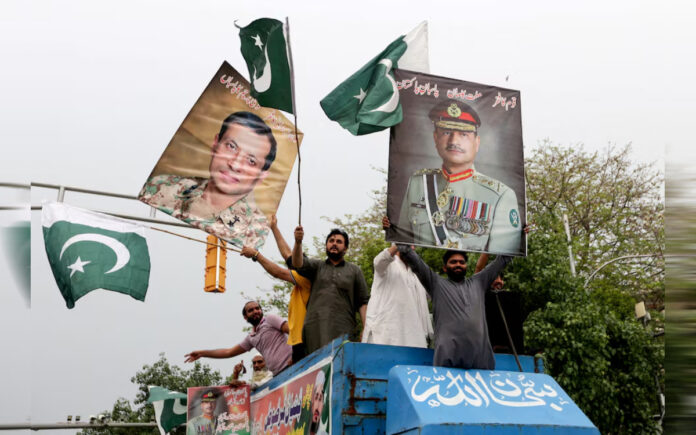Islamabad: Pakistan’s army chief, General Asim Munir, long regarded as the most powerful figure in the country, has seen a remarkable surge in public support following the most intense military confrontation with India in decades. The renewed acclaim has overshadowed earlier criticism of his hardline domestic policies and cemented the military’s influence in Pakistan’s political and national identity.
In recognition of his leadership during the recent conflict, the Pakistani government conferred upon him the rare distinction of Field Marshal—a move hailed as symbolic of “strategic brilliance and courageous leadership that ensured national security and decisively defeated the enemy.”
While the Pakistani military has historically wielded immense authority—even during civilian rule—analysts note that the outpouring of public admiration for Munir is unprecedented in recent times. Placards reading “Long live General Asim Munir!” were seen across cities, while his portraits adorned bridges and lamp posts. Some banners referred to him as “our saviour,” reflecting the emotional surge of patriotism sparked by the confrontation.
A Gallup Pakistan survey conducted shortly after the clashes revealed that 93% of respondents reported a more favorable view of the military, marking a dramatic shift in public sentiment.
Even former Prime Minister Imran Khan, Munir’s fiercest political rival and currently imprisoned, joined the chorus of praise. “It’s my country, it’s my army,” Khan posted on X. “I pay tribute to the Pakistan Air Force and all our military personnel for their professionalism and outstanding performance.”
Political analyst Yousuf Nazar noted, “He has emerged as Pakistan’s strongman with his military’s reputation restored as a formidable force.”
Munir’s journey to this status has been fraught with internal challenges. After assuming command in November 2022, he faced one of the toughest tests to the army’s authority when Imran Khan’s supporters stormed military sites. Munir was subsequently criticized for the crackdown on Khan’s Pakistan Tehreek-e-Insaf party and for alleged electoral manipulation in favor of rival political forces during last year’s general elections.
But the tide of public opinion shifted dramatically following the military confrontation with India.
“It has made the general stronger than any other previous generals. He is a hero now,” said Ayesha Siddiqa, author of Military Inc, a book chronicling the role of Pakistan’s armed forces. She described the brewing geopolitical rivalry as one between two ideologically driven leaders—“It’s an Islamist general versus a religious strongman.”
The Pakistani military declined to respond to requests for comment.
Also Read | India Expels Another Pakistani Diplomat Over Undisclosed Activities
Clash With India: The Turning Point
Tensions ignited after an April 22 attack in Indian-administered Kashmir left 26 people dead, most of them tourists. New Delhi blamed Pakistan-based militants for the assault—a charge that Islamabad firmly denied.
In retaliation, on May 7, the Indian military launched airstrikes against what it described as “terrorist infrastructure” within Pakistan. Pakistan responded with a counter-operation on May 10, claiming to have downed 5-6 Indian fighter jets and launched precision strikes on Indian military bases. India, for its part, acknowledged suffering losses but claimed it had inflicted major damage on key Pakistani air bases and air defense systems.
General Munir named the counter-strike “Bunyan Marsoos”—meaning “Iron Wall”, referencing a verse from the Koran (Qur’an)—and ordered the operation to begin at dawn, a sacred time for Muslims.
In a speech delivered in Islamabad a week before the Kashmir attack, Munir underscored the ideological divide between the neighboring nations. “Our religion is different. Our customs are different. Our traditions are different,” he stated. Quoting verses from the Koran, he added: “The Indian army, with all their wherewithal, cannot intimidate Pakistan. Pakistan needs to be a hard state.”
Munir, who has memorized the Koran, is a former head of both the Inter-Services Intelligence (ISI) and Military Intelligence. He comes from humble beginnings as the son of a schoolteacher and is an infantry officer by training. His tenure as army chief extends until November 2027, with the possibility of a five-year extension.
Husain Haqqani, former Pakistani ambassador to the United States, remarked that Munir has always been more hawkish toward India than his predecessor, who had leaned toward improving bilateral ties. “Conflicts with India remind Pakistanis of the fragility of their country and they rally to their army as the entity that will save the country,” Haqqani said. “The recent show of strength and standing up to India has helped General Munir solidify his position within the country.”



